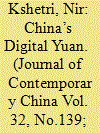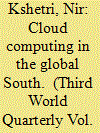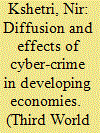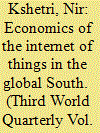| Srl | Item |
| 1 |
ID:
191874


|
|
|
|
|
| Summary/Abstract |
This article highlights the key motivations behind China’s plan to launch the digital yuan and reviews the potential impacts on China and abroad. The article analyzes the digital yuan’s benefits to consumers, such as a reliable low-risk, low cost, and high-efficiency payment solution and the potential to promote financial inclusion. It compares the digital yuan with its most prominent competitors. Also discussed is how the digital yuan is expected to provide the Chinese Communist Party with a new powerful tool to monitor and control its economy and people. The article provides a critical evaluation of the potential of the digital yuan’s internationalization. This article also provides a perspective on the digital yuan to set global standards for the development of national digital currencies.
|
|
|
|
|
|
|
|
|
|
|
|
|
|
|
|
| 2 |
ID:
106661


|
|
|
|
|
| Publication |
2011.
|
| Summary/Abstract |
Cloud computing has started to transform economic activities in the global South. Many businesses are taking advantage of the pay-as-you-go model of the technology, and its scalability and flexibility features, and government agencies in the South have been investing in cloud-related mega-projects. Cloud-based mobile applications are becoming increasingly popular and the pervasiveness of cellphones means that the cloud may transform the way these devices are used. However, findings and conclusions drawn from surveys, studies and experiences of companies on the potential and impact of cloud computing in the developing world are inconsistent. This article reviews cloud diffusion in developing economies and examines some firms in the cloud's supply side in these economies to present a framework for evaluating the attractiveness of this technology in the context of evolving needs, capabilities and competitive positions. It examines how various determinants related to the development and structure of related industries, externality mechanisms and institutional legitimacy affect cloud-related performances and impacts.
|
|
|
|
|
|
|
|
|
|
|
|
|
|
|
|
| 3 |
ID:
134180


|
|
|
|
|
| Publication |
2014.
|
| Summary/Abstract |
In this paper, we argue that the two Koreas' intentions and actions on the cyber front point toward the possibility that they have engaged in cyber warfare against each other. From South Korea's standpoint, a key concern has been North Korea's advanced cyber warfare capabilities and alleged involvement of its substantial workforce in the Internet's dark side activities. These issues need to be looked at the backdrop of the North's nuclear and ballistic missile capabilities. This paper draws principally upon theories and concepts from military strategy and warfare to examine the contexts, mechanisms, and processes associated with the cyber warfare in the Korean peninsula. We also compare the two Koreas in terms of various forms of asymmetries in cyber warfare and cyber attacks. Also highlighted in the paper are South Korea's recent initiatives and actions to enhance cyber-offense and cyber-defense capabilities.
|
|
|
|
|
|
|
|
|
|
|
|
|
|
|
|
| 4 |
ID:
100318


|
|
|
|
|
| Publication |
2010.
|
| Summary/Abstract |
Cyber-crime's footprints across the developing world are getting bigger. The aim of this article is to examine the structure of cyber-crimes in developing economies. Its central idea is that economic and institutional factors facing cyber-criminals and potential victims in the developing world are different from those in the developed world. In economies characterised by low internet penetration rates and few resources devoted to fighting cyber-crimes, formal institutions related to such crimes tend to be thin and dysfunctional. A cyber-criminal is less likely to be stigmatised in such economies. Moreover, organisations' and individuals' technological and behavioural defence mechanisms are likely to be weaker. Many people in developing economies are also attracted into cyber-crime because of high unemployment and low wages.
|
|
|
|
|
|
|
|
|
|
|
|
|
|
|
|
| 5 |
ID:
151499


|
|
|
|
|
| Summary/Abstract |
While the Internet of Things (IoT) is not new, its key components are becoming increasingly affordable now, which makes the technology extremely attractive for the Global South. By collecting data from various IoT sources, combining them with data from other sources and using big data analytics, decisions can be made and actions can be taken that can have important economic, social, ecological and environmental implications in these countries. The most visible impacts of the IoT in these countries include improvements in agricultural and food systems, enhancement of environmental security and resource conservation, achievement of better healthcare, public health and medicine, and enhancement of the efficiency of key industries. This paper provides an overview of how the IoT is currently being used in the Global South. It also discusses the opportunities and challenges that IoT initiatives present there. The analysis indicates that the IoT may address some of the institutional bottlenecks, technological challenges and key sources of high transaction costs. On the other hand, various sources of underdevelopment may act as barriers to full utilisation of the IoT.
|
|
|
|
|
|
|
|
|
|
|
|
|
|
|
|
| 6 |
ID:
153136


|
|
|
|
|
| Summary/Abstract |
Just like its recent predecessors, blockchain – also known as the distributed ledger technology – is considered to have the potential to cause major economic, political and social transformations in the Global South. The visible effects of this technology are already being noted there. We present early evidence linking the use of blockchain in overcoming some economic, social and political challenges facing the Global South. The article highlights the key applications and uses of blockchain in developing countries. It demonstrates how blockchain can help promote transparency, build trust and reputation, and enhance efficiency in transactions. The article looks at opportunities and key triggers for blockchain diffusion in these countries. It also delves into challenges and obstacles that developing economies are likely to encounter in the use of blockchain.
|
|
|
|
|
|
|
|
|
|
|
|
|
|
|
|